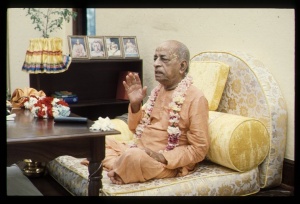SB 3.2.28

A.C. Bhaktivedanta Swami Prabhupada
TEXT 28
- kaumārīṁ darśayaṁś ceṣṭāṁ
- prekṣaṇīyāṁ vrajaukasām
- rudann iva hasan mugdha-
- bāla-siṁhāvalokanaḥ
SYNONYMS
kaumārīm — just suitable to childhood; darśayan — while showing; ceṣṭām — activities; prekṣaṇīyām — worthy to be seen; vraja-okasām — by the inhabitants of the land of Vṛndāvana; rudan — crying; iva — just like; hasan — laughing; mugdha — struck with wonder; bāla-siṁha — lion cub; avalokanaḥ — looking like that.
TRANSLATION
When the Lord displayed His activities just suitable for childhood, He was visible only to the residents of Vṛndāvana. Sometimes He would cry and sometimes laugh, just like a child, and while so doing He would appear like a lion cub.
PURPORT
If anyone wants to enjoy the childhood pastimes of the Lord, then he has to follow in the footsteps of the residents of Vraja like Nanda, Upananda and other parental inhabitants. A child may insist on having something and cry like anything to get it, disturbing the whole neighborhood, and then immediately after achieving the desired thing, he laughs. Such crying and laughing is enjoyable to the parents and elderly members of the family, so the Lord would simultaneously cry and laugh in this way and merge His devotee-parents in the humor of transcendental pleasure. These incidents are enjoyable only by the residents of Vraja like Nanda Mahārāja, and not by the impersonalist worshipers of Brahman or Paramātmā. Sometimes when attacked in the forest by demons, Kṛṣṇa would appear struck with wonder, but He looked on them like the cub of a lion and killed them. His childhood companions would also be struck with wonder, and when they came back home they would narrate the story to their parents, and everyone would appreciate the qualities of their Kṛṣṇa. Child Kṛṣṇa did not belong only to His parents, Nanda and Yaśodā; He was the son of all the elderly inhabitants of Vṛndāvana and the friend of all contemporary boys and girls. Everyone loved Kṛṣṇa. He was the life and soul of everyone, including the animals, the cows and the calves.